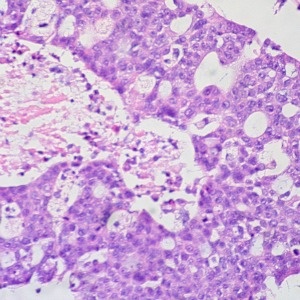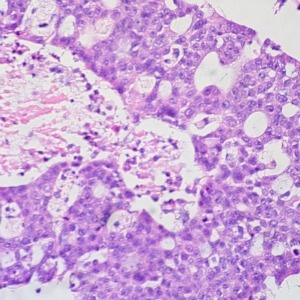
Check ‘hidden bipolar’ in teenage depression
One in 10 people aged between 18 and 40 being treated for depression in primary care have unrecognised bipolar disorder, say UK researchers.
A group from the Leeds and York Partnership NHS Foundation Trust interviewed and sent questionnaires to patients who were taking antidepressants, and found that 7.3% of them had unrecognised bipolar disorder.
They estimated the nationwide prevalence of unrecognised bipolar disorder in this patient group was 10%. Previous estimates put this figure between 0.5% and 4.3%.
The researchers concluded: ‘Primary care clinicians should review life histories for evidence of unrecognised bipolar disorder, particularly bipolar II disorder, when seeing patients with depression or anxiety disorder.’
Br J Gen Prac 2016, online 1 Feb
GPs ‘bending rules’ on cancer referrals
Around 90% of UK GPs say they would ignore clinical guidance and send patients for tests if they suspected cancer, but the symptoms did not fit the criteria for urgent referral.
A new study on the international variation on adherence to cancer-specific referral diagnostic guidelines, led by researchers at the University of Oxford, found that 20% of these GPs said they would ‘record the patient’s history in such a way that allowed them to fit the guidelines for urgent referral’.
The study also found GPs in England, Wales and Northern Ireland were less likely to follow recommendations than their non-UK counterparts. Significantly, the study found no link between adherence to guideline recommendations and one-year cancer survival rates.
Lead author Dr Brian Nicholson, a GP and clinical fellow at the university’s department of primary care health sciences, said: ‘What’s interesting here is the tendency for GPs to “bend the rule” to ensure patients with concerning symptoms, who do not fit referral criteria, get rapid assessment.’
Br J Gen Prac 2016, online 1 Feb
Knee braces ‘could prevent falls in OA’
GPs should treat knee buckling in older people with osteoarthritis as a ‘priority’ and use targeted exercises to prevent future falls and provide peace of mind.
Researchers examined the association of knee buckling with the risk of falling in adults aged between 55 and 84 with, or at high risk of, OA. They found that those who experienced knee buckling were two to three times more likely to have fallen within the past year.
About one in five participants fell as a result of knee buckling, and these people were also found to have a higher risk of recurrent falls, injury or poor balance confidence two years later.
The results suggest that knee buckling is an independent risk factor for falls in people with knee pain or OA, and the team urged GPs to use interventions that directly treat knee instability in order to prevent future falls.
Dr Tom Margham, a GP in east London and former spokesperson for Arthritis Research UK, said: ‘Taking steps to manage instability is a promising way of improving pain and symptoms [in patients with OA]. Bracing is one method, but exercises to improve muscle strength around the knee are important too and need no specialist equipment.’
Arthritis Care and Research 2015
Chronic fatigue ‘may affect 2% of teens’
Chronic fatigue syndrome (CFS) may be more common than originally thought, affecting nearly 2% of teenagers, new research has claimed.
The study surveyed 16-year-olds and their parents about mood and behaviour, and found that one in 50 teenagers is likely to experience CFS for more than three months, with girls almost twice as likely as boys to be affected.
Teenagers from families with more financial or emotional problems were also found to be at a higher risk of CFS.
The researchers, from the University of Bristol, did concede that a diagnosis of CFS was made using questionnaire responses rather than through a clinical classification, but argued this was adequate, saying: ‘We are confident as we can be that we have the right prevalence figures here. The participants were not diagnosed by a doctor, but you can’t do that as half wouldn’t turn up.’
Pediatrics 2016, online 25 Jan
Early therapy ‘reduces hay fever’ in over-65s
Preseasonal subcutaneous immunotherapy reduces symptoms of hay fever in older patients, Polish researchers have claimed.
A three-year double-blinded, placebo-controlled study in hay fever sufferers aged 65-75 found those in the treatment group experienced an overall reduction in symptoms and medication use of 41% compared with the placebo group.
When medication wasn’t considered, patients that received immunotherapy saw a drop in their symptoms of 55% during the grass pollen season and did not experience any allergic reactions.
But Dr Dermot Ryan, former GP and current chair of the Primary Care Interest Group of the European Academy of Allergy, said: ‘An allergist would have to apply to a CCG on a named-patient basis to justify the expense of a three-year course of treatment, and that is if a GP even had access to an allergist’.
Ann Allergy Asthma Immunol 2016, online 1 Feb
Therapeutics update
Mirabegron contraindicated in patients with severe uncontrolled hypertension
After a Medicines and Healthcare products Regulatory Agency review of safety data for mirabegron (Betmiga), the drug is now contraindicated in severe uncontrolled hypertension (systolic ≥180mmHg or diastolic ≥110mmHg).
Ezetimibe in hypercholesterolaemia
NICE has approved ezetimibe for use in adults with hypercholesterolaemia in whom initial statin therapy is contraindicated or not tolerated.
Pulse October survey
Take our July 2025 survey to potentially win £1.000 worth of tokens













